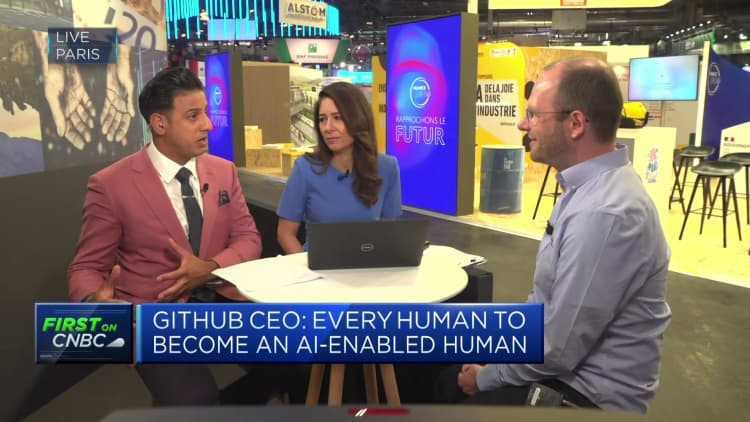Microsoft-owned GitHub says that 90% of the world’s open-source projects are stored on its code repository platform.
Jonathan Raa | Nurphoto via Getty Images
Microsoft-owned developer platform GitHub on Tuesday said it is giving enterprise users the ability to limit the storage of their sensitive software code to data centers located in the European Union.
The move, which is part of a bid to meet the bloc’s strict data protection requirements, comes amid a broader political push for digital “sovereignty.”
The company said that it would offer customers of its GitHub Enterprise Cloud greater control over where their repository data is stored, with the option to hold it only in Microsoft Azure-owned severs within the EU, rather than in other countries where data protections may be less robust.
Firms will be able to control the “data residency” of software code stored on GitHub — effectively meaning they can decide which regions the data is kept in.
GitHub said enterprise users will be given the ability to manage and control user accounts and choose unique namespaces specific to their company that are separate from their open-source experience.
Business users will also be given enhanced business continuity support and disaster recovery, which could help in the event of any cyber breaches or outages affecting physical server equipment.
GitHub Enterprise Cloud is a paid product the firm only offers to businesses. Companies using its enterprise-focused tools tend to store closed-source — rather than open-source — software projects on the platform.

GitHub is primarily known as a destination for individual coders and teams to create and store open-source code. However, the firm has been increasingly pushing a business-to-business sales model, especially after its takeover by Microsoft in 2018.
For businesses storing closed-source projects, the ability to control where that sensitive programming is stored and controlled, as well as the level of access granted to users, is paramount — especially in the EU, according to GitHub CEO Thomas Dohmke.
“Europe is the place where cutting-edge regulation and laws around privacy and data protection and many other things, like AI, were born,” Dohmke told CNBC on a video call. “Here there are exciting frameworks to transfer data back and forth around the world.”
“Data residency emerged as an important driver for any enterprise’s cloud strategy, and enterprises want to know where crucial assets like data is being stored,” he added.
Shelley McKinley, GitHub’s chief legal officer, said that closed-source code is today considered the “crown jewels” of a company’s digital strategy.
“European customers were demanding more from us in this area,” she told CNBC. “The EU has been in the center of this [data residency] movement since the beginning of the cloud days.”
Going forward, GitHub plans to roll out data residency within its GitHub Enterprise Cloud across other regions, including Australia, Asia, and Latin America.
EU push for digital ‘sovereignty’
GitHub’s data residency push ties into a broader political and regulatory theme within the EU around so-called digital “sovereignty.”
The EU is investing billions into what it believes are fundamental and core technologies to boost its tech sovereignty and reduce dependency on the U.S. and China. The region is currently heavily reliant on technologies that come from beyond its borders. Top officials are in the process of trying to change this.
Earlier this month, a long-awaited report from former European Central Bank President Mario Draghi called for 800 billion euros of additional investment per year to make the bloc more competitive, citing technology innovation as a key area where improvement is needed.
“Europe must profoundly refocus its collective efforts on closing the innovation gap with the US and China, especially in advanced technologies. Europe is stuck in a static industrial structure with few new companies rising up to disrupt existing industries or develop new growth engines,” Draghi said in the report.
GitHub’s Dohmke said that Europe is currently lagging behind the U.S. and China when it comes to adoption of cloud computing.

According to figures from data center operator Stackscale, 45% of EU enterprises used cloud computing last year, up about 4 percentage points from 2021 to 2023. But it is particularly low in certain countries.
For example, in France, only 27% of enterprises in the EU use cloud technology, whereas in Nordic countries adoption rates are much higher, with 78% of enterprises using the cloud in Finland.
From a global perspective, though, Dohmke said he is optimistic about the future of tech advancements. In November last year, GitHub launched a new version of its “Copilot” programming assistant, called GitHub Copilot Enterprise, to give developers inside companies a way to more easily generate software code using AI technology.
According to Dohmke, developers using its Copilot assistant have been able to generate code 55% faster than programmers not using the AI software.
In the future, he envisages a world where AI automates an even greater share of the workload involved in writing code.
Developers will start to get “AI-native agents” to fulfil certain tasks in their coding journeys, he said, adding that it’ll also become easier for people who aren’t software programmers to be able to create their own software code thanks to artificial intelligence.







